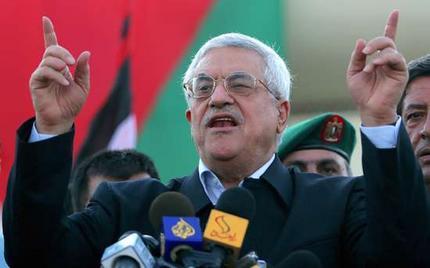The expression “Hanukkah miracle” was heard more than once on Thursday in the communities of the western Negev region of Israel.
A Kassam rocket fired on Wednesday evening at Sderot – one of many-landed in the bustling commercial center.
No one was killed or badly hurt. Three people sustained light injuries and nine suffered from shock.
The Palestinian terror organizations Thursday gave residents of southern Israel a “first taste” of what is liable to happen when the “truce” ends this weekend.
<!–
AdSys ad not found for news/world/middle_east_correspondent:instory –>
Palestinian shelling began in the early morning hours of Wednesday when seven Kassam rockets broke the sleep of the residents of the Eshkol Regional Council. One fell in a greenhouse and caused light damage. No one was injured. Later a mortar shell fell in the Nahal Oz area; another Kassam rocket landed south of Ashkelon, and two people were taken to Barzilai Hospital with ear infection; another rocket landed between Kibbutz Netiv Haasara and Kibbutz Yad Mordechai and another Kassam rocket fell near Miflasim.
At about 4 p.m., four Kassam rockets were fired at the communities of the Shaar Hanegev Regional Council. All fell in open areas. The Israel Air Force fired at the launchers in Beit Hanoun and destroyed them.
At 5 p.m., Islamic Jihad terrorists fired a 115-caliber Kassam rocket from north of the Gaza Strip that landed in the parking lot of the Victory Supermarket at Sderot’s bustling Peretz shopping Center which was full of people.
Only seven feet separated the place where the Kassam rocket fell and the entrance to the supermarket. The rocket caused great damage outside and inside the supermarket. Inside many wine bottles could be seen shattered and strewn on the floor along with shards from the plate glass windows.
Some of the cashiers and the many customers at the supermarket panicked and cried, seeking family members with concern.
Outside the supermarket, there were scenes of hysteria, when people what realized what a miracle had happened.
Many cars parked in the lot were badly damaged and there was a strong smell of gasoline fumes in the air.
Many people talked about a Hanukkah miracle because after the panic had subsided, it turned out that only three people had sustained light injuries from shards and were taken to Barzilai Hospital.
As the truce was about to end, Sderot Mayor David Buskila, declared there never was a truce.
“I’m surprised by everyone’s surprise, there never was a truce, every day we took Kassams. What are we waiting for? I feel that all these threats have turned the state into a joke, our power of deterrence is at a low. We have to be prescient and foresee events,” he said.
Mr. Buskila added: “The state has to give its residents a sense of security. The only message that I get from the prime minister and defense minister is stuttering and indecision. When, God forbid, someone is hit and there are funerals, I won’t let them in to the city.”
As of Thursday evening, the Israel Army spokesman confirmed there had been 418 attacks from Gaza during the six months that were described as a truce, with little Israeli response.
IDF’S Response: There Are Plans, There Is No Action
Despite the rocket fire at Sderot on Thursday, the Israeli army is still not preparing to respond. Defense Minister Ehud Barak is continuing to give the truce a chance despite Hamas’ declarations that it will be over Friday.
Hamas issued a statement on Thursday stating that “Friday is the last day of the ‘tahdia’ (the Arabic word for ‘truce’). From that date, Hamas maintains the right to defend the Palestinian people and will respond to any Israeli action.”
Israel Defense Minister Ehud Barak declared that “we are not deterred from large-scale action in Gaza, but we’re not rushing into such action. When the situation requires us to act, we’ll act. We will decide what is the best way at every stage, what place and at what time. I suggest that we leave these considerations to the political echelon.”
Prime Minister Ehud Olmert said, “there cannot be a situation in which there is agreement on a truce but the reality on the ground is completely different. Naturally this requires our attention-and such attention will be given.”
Foreign Minister Tzipi Livni declared that her strategic goal, if and when she becomes prime minister, will be to topple the Hamas regime in Gaza.
However, all this is words. The Israeli government is taking no action at the present time.
In a press conference held in Sderot on Thursday under the auspices of the Sderot Media Center, which operates under the auspices of the Sderot Information Center for the Western Negev, Shai Hermesh. a Knesset Parliament member of Kadima, the ruling Israeli political party, made an incisive comment to the media.
According to Mr. Hermesh’s understanding, there will be no Israeli military response to what is transpiring in Gaza, until after the Israeli national elections, set for Feb. 10, 2009.
Mr. Hermesh declared that no Israeli government will launch any military action during a political campaign.
David Bedein can be reached at dbedein@israelbehindthenews.com






